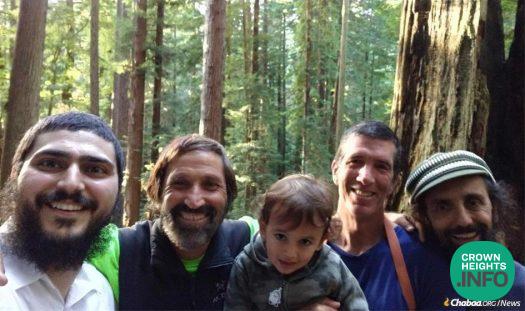
What It’s Like to Be the Rabbi of the Redwoods
by Menachem Posner – chabad.org
Featuring more than 100 miles of pristine Pacific coastline and mountain ranges covered with Old Growth redwoods, Humboldt County, California, is not easy to reach; accessible via air or winding mountain roads that navigate steep ravines and carefully skirt the towering redwoods for which the area is famous.
Despite its isolation, or perhaps precisely because of its isolation, the county has long been a magnet for spiritual seekers, hermits, and others looking to live simply and in harmony with nature.
Since 2012, the county’s Jewish community has been served by Rabbi Eli and Mushkie Cowen, who direct Chabad of Humboldt, based in Arcata, a rural town with a population of less than 18,000.
In this interview, part of our ongoing What’s It Like series, Rabbi Cowen shares what makes his community unique, and what life is like among earth’s tallest living beings, some of which are believed to be 2,000 years old.
Q: Rabbi Cowen, before we get to Humboldt, let’s talk about you and your family. Where are you from, and what attracted you to the area?
I grew up in West Hartford, Conn., where my father served as a Chabad rabbi. When I was in ninth grade, we moved to Pittsburgh, to take advantage of the excellent Chabad educational system there. Mushkie is originally from Albany, N.Y. and Far Rockaway, N.Y.
By the time we met, we were both living in Brooklyn, where I was in yeshivah. After our marriage in 2011, we planned to stay at least a year, while I furthered my studies in Kollel, but one thing led to another, and in the summer of 2012 we heard about Arcata and were hooked.
The people here are very spiritually open and tuned in to nature, G‑d, and other things that people in big cities tend to ignore.
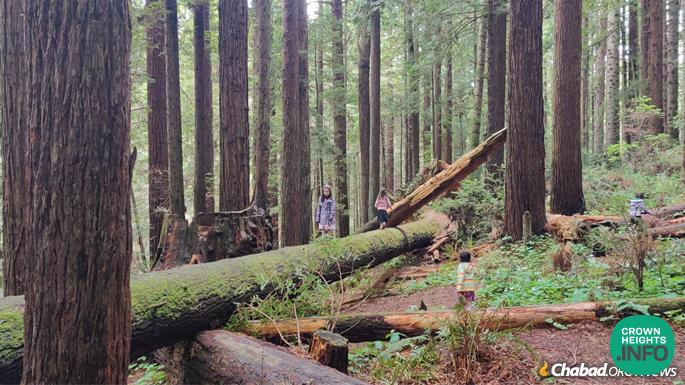
Life takes place at a slower pace here. People are happy to talk, discover, and absorb things in their own way.
Like in the stories of the Baal Shem Tov, people here really connect to G‑d in nature, recognizing His majesty in the quiet of the forest and in the thunder of the ocean.

Q: What is the community like, and whom do you serve?
Arcata is home to Humboldt State University, which has a sizable Jewish population, and we serve both the college students as well as the families and individuals who live here full-time.
Most of the Jews live within a half-hour drive of us, but Humboldt County is very large, and there are some in remote towns and villages several hours away. Over Chanukah, we had yeshiva students visiting, and they drove all around the county, meeting families as far as Garberville and Shelter Cove.
On the last day of Chanukah, they helped organize our Chanukah Wonderland on the Arcata Plaza and the grand public menorah lighting that followed.
We offer Shabbat services, holiday programs, youth programs, Torah classes, and everything else you’d expect at a Chabad House.
The Chabad House is on a large plot of land, with a bunch of redwoods, of course. The main floor has the synagogue and community center, and we live on the upper level.
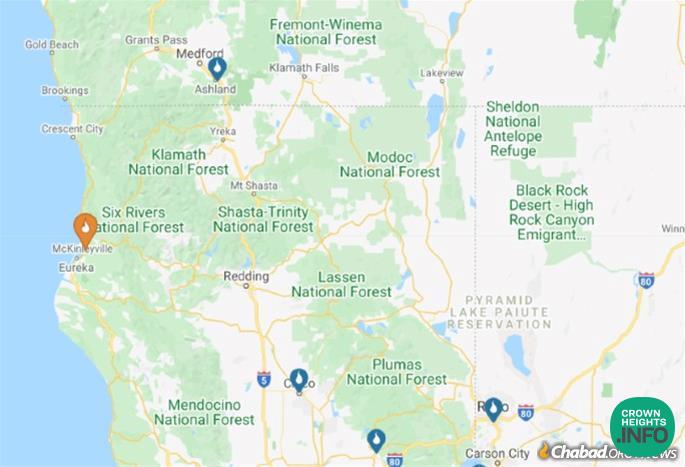
We are especially glad that we are in the process of building a local mikvah, adjacent to the Chabad House. Until now, it was a 5-hour drive through what we call the “Redwood Curtain” to the Mikvah in Chico.
It takes longer than one would expect because the only way to enter or leave Humboldt County is the 299, a narrow, winding road that is sometimes held up for miles due to rockslides or other unforeseen circumstances.
We have quite a few couples who are committed to the mitzvah of mikvah, who are eagerly looking forward to having this local amenity.
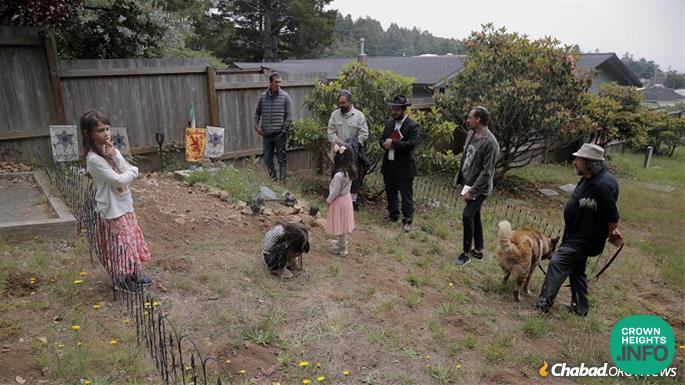
Q: What is the culture like?
Humboldt is known as a place where people still live the ideals and inspirations of the original hippy movement. People divest themselves from material wealth and instead focus on family, spirituality, human connections, and harmony.
When we moved here, we found it so refreshing that we could just approach people and say hi. Instead of rushing away, they were curious to know about what we are all about and how they could incorporate it into their lives.
We live with the Rebbe’s approach to the hippy movement, celebrating their honest thirst for spirituality and their willingness to question conventional thinking.
When we built our Chabad House, quite a few people told us how they had waited so long for Arcata to finally have an official Jewish presence.
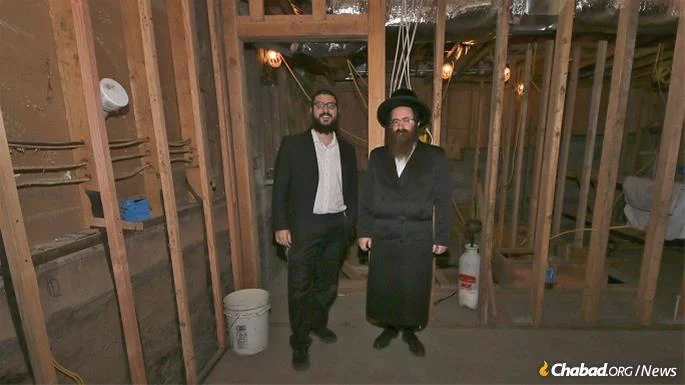
Q: It sounds beautiful. Are there many tourists?
Not in the conventional sense. There are no large hotels and other commercial tourist traps, and we are off the beaten path without easy Interstate access. But there are people who drive through and spend time here. It’s really a hidden gem of natural untouched beauty!
And of course, if you come here, you need to like rain. It’s temperate here, not too hot and not too cold, but it’s misty and rainy!
Q: Are there Jewish children there?
Yes, there are some Jewish families! In fact, we recently opened a Jewish children’s lending library, which we are very excited about. We have a teen club every Sunday and a small Hebrew school every Monday.
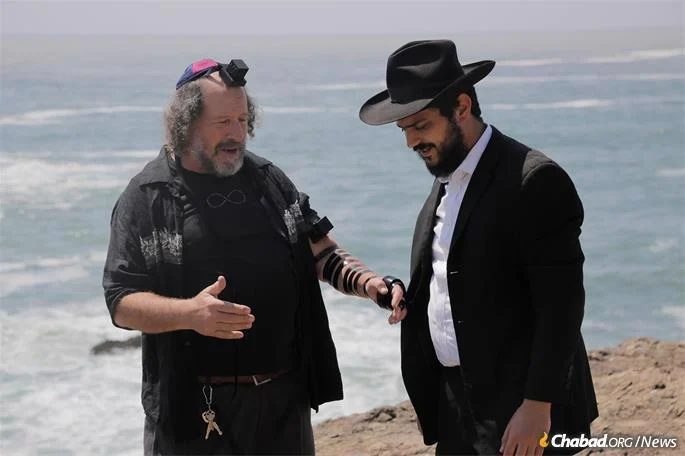
Q: What do you do for kosher food?
Since we are not near the main arteries, we cannot arrange a stop on the trucks heading from LA to Seattle.
For fresh produce and other necessities, we can shop in our local stores, which are mostly co-ops and other health food stores, or at the larger chain stores in Eureka, the next town over, which is somewhat bigger.
For meat and dairy, we rely on friends who occasionally drive up from LA with a minivan or pickup truck stocked with supplies.
Q: Living so far from established Jewish communities, what keeps you going?
For us and our children, the oldest of whom is 8, this is home! The people are our people, their lifestyle is our lifestyle, and their Jewish future is our future.
And we wouldn’t want it any other way!
This article has been reprinted with permission from chabad.org













Dovi
Wow this sounds so nice I’d love to find out more and maybe even help out at some point sounds really interesting